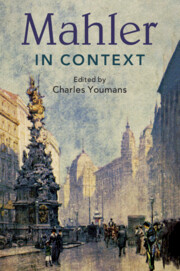Book contents
- Mahler in Context
- Composers in Context
- Mahler in Context
- Copyright page
- Dedication
- Contents
- Figures
- Music Examples
- Notes on Contributors
- Preface and Acknowledgments
- Abbreviations
- Part I Formation
- Part II Performance
- Part III Creation
- Part IV Mind, Body, Spirit
- Chapter 20 Organized Religion
- Chapter 21 German Idealism
- Chapter 22 Nietzsche
- Chapter 23 Fechner
- Chapter 24 Literary Enthusiasms
- Chapter 25 Romantic Relationships
- Chapter 26 Mahler and Death
- Part V Influence
- Further Reading
- Index
Chapter 22 - Nietzsche
from Part IV - Mind, Body, Spirit
Published online by Cambridge University Press: 18 December 2020
- Mahler in Context
- Composers in Context
- Mahler in Context
- Copyright page
- Dedication
- Contents
- Figures
- Music Examples
- Notes on Contributors
- Preface and Acknowledgments
- Abbreviations
- Part I Formation
- Part II Performance
- Part III Creation
- Part IV Mind, Body, Spirit
- Chapter 20 Organized Religion
- Chapter 21 German Idealism
- Chapter 22 Nietzsche
- Chapter 23 Fechner
- Chapter 24 Literary Enthusiasms
- Chapter 25 Romantic Relationships
- Chapter 26 Mahler and Death
- Part V Influence
- Further Reading
- Index
Summary
Though Mahler by no means embraced a Nietzschean worldview, the philosopher-psychologist was an important presence in his thinking, both in his student days in Vienna and during his maturity (particularly with the Third Symphony [1896]). This chapter offers a fresh perspective on those ideas of Nietzsche that would have been available to Mahler, whether he interacted with them explicitly or not. These include Nietzsche as idiosyncratic philo-Semite, as left-wing liberator keen to undermine sclerotic social and political conventions, as prophet of the rebirth of ancient dramatic culture in the contemporary German-speaking world, as antagonist of liberalism’s individualist greed through reawakening the emotional elements of a culture, as advocate of the twin impulses of utopianism and self-destruction, and as a post-Wagnerian hoping to supplant the Christian myth of delivery through the Redeemer by his return to ancient Greece.
- Type
- Chapter
- Information
- Mahler in Context , pp. 189 - 197Publisher: Cambridge University PressPrint publication year: 2020

